The Spiraling Absurdity of Germany’s Pro-Israel Fanaticism
EUROPE, 25 Mar 2024
Michael Sappir | +972 Magazine - TRANSCEND Media Service
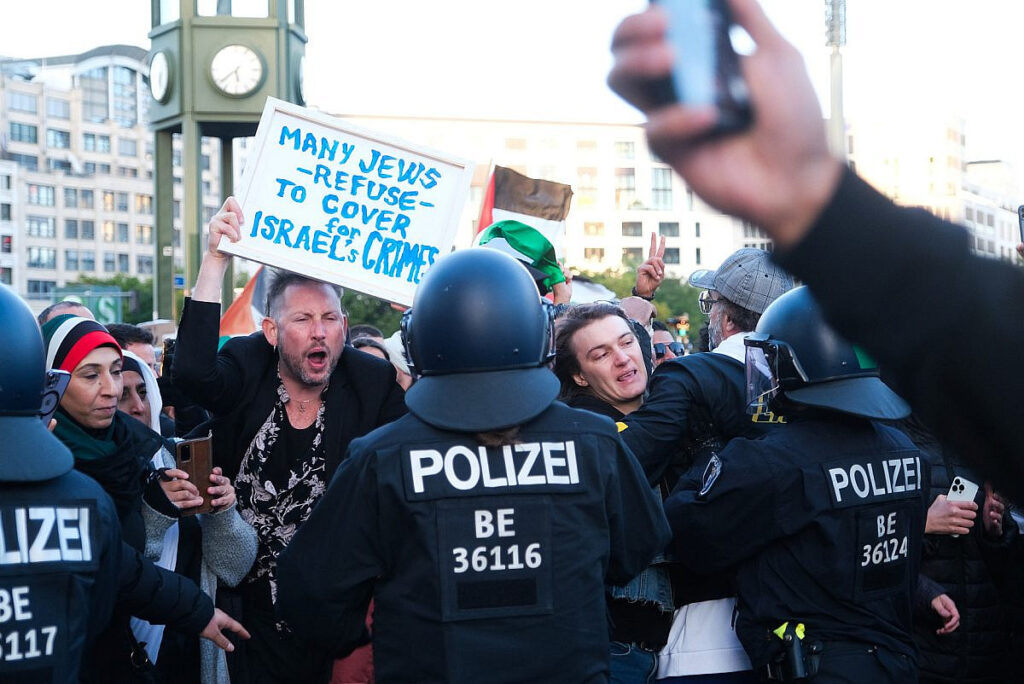
A Palestine solidarity demonstration in the Potsdamer Platz area, Berlin, 15 Oct 2023. German police suppressed the demonstration shortly after authorizing it.
As repression of Palestine solidarity penetrates every sector of life, the state’s liberal self-image is fast becoming a story Germans can only tell themselves.
21 Mar 2024 – After years in which Germany has increasingly narrowed the space for Palestine solidarity, the state’s intense clampdown on freedom of expression in the wake of Hamas’ October 7 attack and Israel’s ensuing assault on the Gaza Strip will have surprised few observers. Still, the frenzy surrounding the country’s prestigious Berlinale international film festival in late February took the absurdity of Germany’s fanatical pro-Israelism to new levels.
Basel Adra and Yuval Abraham — who are Palestinian and Israeli respectively, and both longtime writers for +972 Magazine and Local Call — were censoriously smeared by German politicians after their film, “No Other Land,” won the Best Documentary Award and the Audience Favorite Documentary Award at the festival. The activists, who are two of the four co-directors and subjects of the film, used their acceptance speeches as a platform to challenge Israel’s violent oppression of Palestinians and Germany’s complicity in the war on Gaza.
In response to Adra and Abraham’s words, which circulated widely on social media, Berlin’s mayor Kai Wegner, from the conservative Christian Democratic Union (CDU), tarred them for spouting “intolerable relativization” and “antisemitism.” Germany’s Culture Minister Claudia Roth insisted that she had only clapped for “the Jewish Israeli … who spoke out in favor of a political solution and a peaceful coexistence in the region” — but apparently not his Palestinian colleague, who spoke out in favor of the same thing. This selective applause was all the more bizarre given that Abraham’s speech was specifically critical about the differential treatment to which he and Adra are subjected under Israel’s apartheid system.
Such public denunciations have become a regular occurrence in Germany, as have the calls for increased censorship and threats of defunding that invariably follow. The atmosphere of generalized suspicion has grown thick, threatening to suffocate the country’s famously vibrant and international cultural scene.
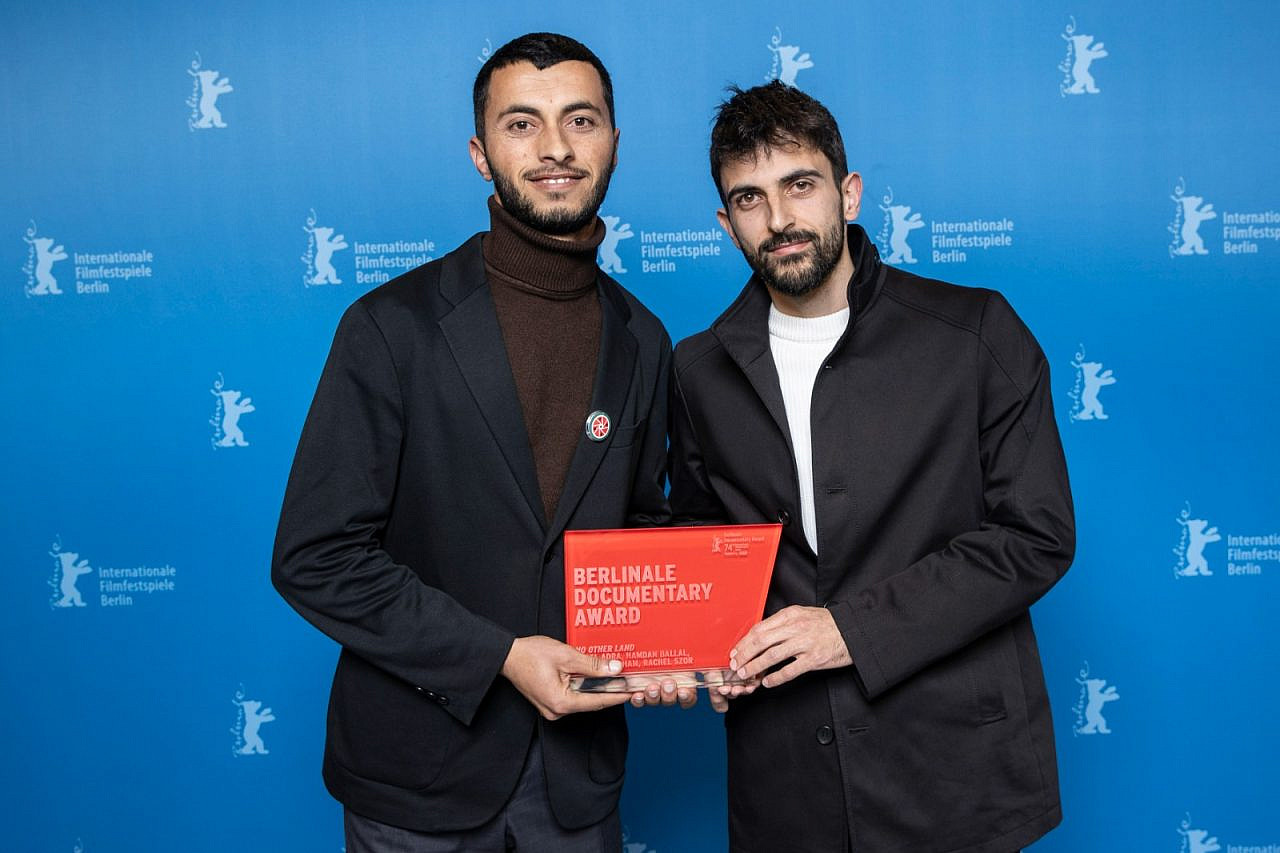
Basel Adra and Yuval Abraham holding the Best Documentary Award for their film ‘No Other Land’ at the Berlinale film festival, February 24, 2024 (Ali Ghandtschi/Berlinale 2024)
On the rare occasion that the accused are so well-known and the accusations so preposterous as to draw international attention, such scandals must serve as a warning to the world — both about Germany’s own illiberal trajectory, and about the dangers posed by enforcing Israel-friendly politics in the public sphere.
Draconian bans
In the immediate aftermath of October 7, Germany imposed a near-total ban on pro-Palestine protests. The few demonstrations that were authorized (due to their small size or palatable messaging), or that took place in defiance of the ban, were largely dispersed by police, some of them violently.
In one startling example, Berlin parents organized a protest against violence in schools after a teacher was documented physically striking a student who wore a Palestinian flag — but even this was banned and dispersed by police.
At the same time, and just as Israel unleashed the first phase of its vengeful bombardment of Gaza while Israeli leaders spouted genocidal rhetoric, German authorities embraced grand shows of support for Israel, championed by leaders from all major political parties. Authorities across Germany also issued draconian bans on pro-Palestine speech and symbols.
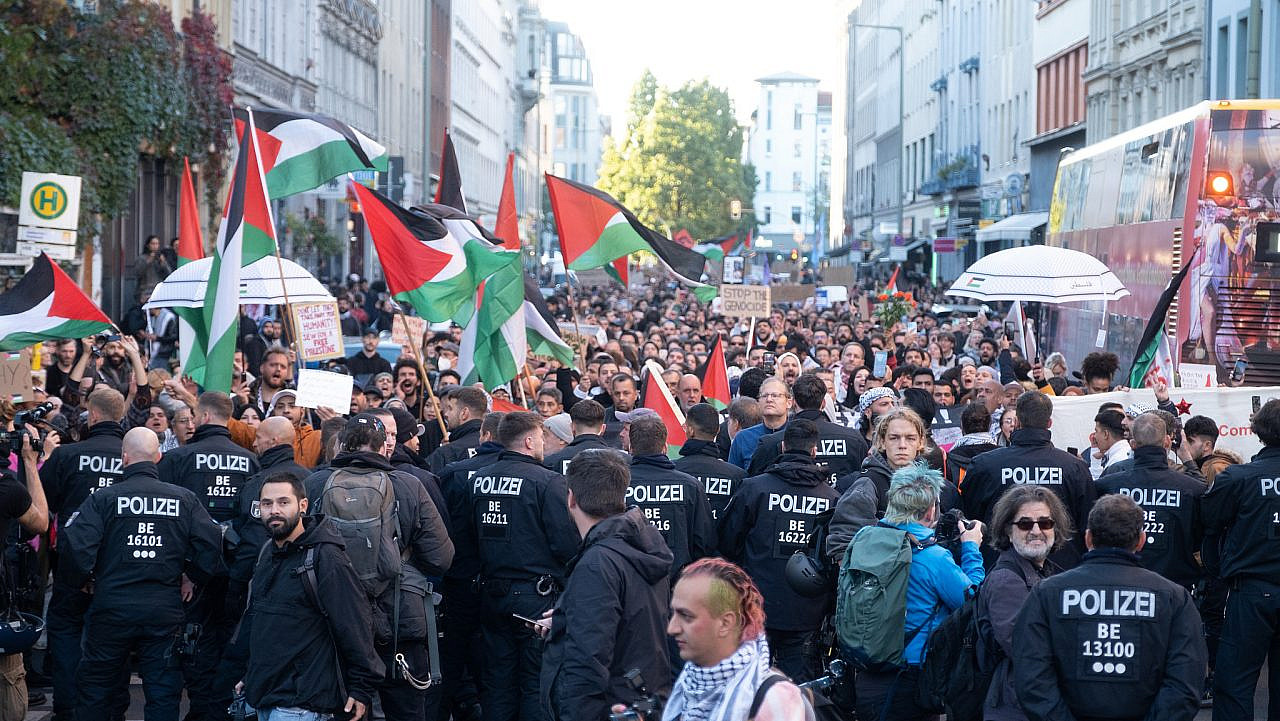
A pro-Palestine demonstration in the Kreuzberg area of Berlin, October 28, 2023.
Police in Berlin, home to Europe’s biggest Palestinian diaspora community, banned the age-old slogan “From the river to the sea, Palestine will be free.” They even enforced the prohibition on variations like “From the river to the sea, we demand equality,” or, according to eyewitnesses, the skeletal “From the — to the —,” as one sign read. In early November, when the federal government outlawed Hamas in Germany, “From the river to the sea” was defined as a forbidden slogan of the organization — in any language and regardless of what follows those words.
In practice, however, enforcement was blatantly one-sided. In one December video, pro-Israel protesters are seen holding up an Israeli flag at Berlin’s Humboldt University and mockingly calling: “From the river to the sea, that’s the only flag you’re gonna see.” The unnamed cameraman approaches police, asking them to intervene against the forbidden slogan, but they refuse, saying it is permissible.
In effect, German authorities took the position that support for Palestinians must be understood as support for indiscriminate violence against Israelis. Moreover, they explicitly adopted the view that calling for an end to the war necessarily equates to denying Israelis the right to defend themselves in the face of such attacks.
Accordingly, just as explicitly pro-Palestinian protests were shut down, police often also suppressed calls for “ceasefire” or to “stop the war.” And in response to South Africa’s charge at the International Court of Justice that Israel is committing genocide in Gaza, the German government rushed to insist that this “accusation has no basis whatsoever,” and authorities within Germany have often treated the accusation as hate speech.
Sympathy is enough
Throughout November and December, after facing massive pushback on Berlin’s streets as well as mounting legal challenges to the blanket bans on protest, authorities gradually relented and began permitting anti-war and pro-Palestinian demonstrations, which now take place regularly across German cities. But other forms of repression have continued unabated, intensifying a years-long trend.
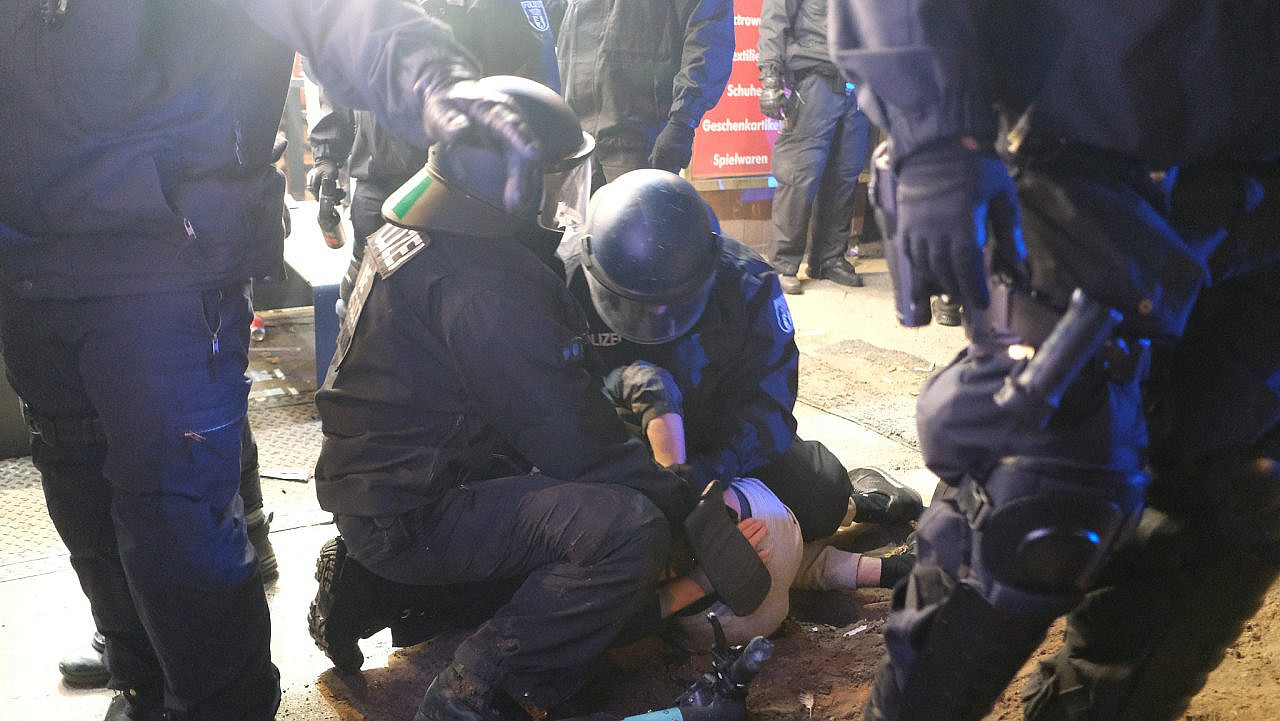
Police suppress a pro-Palestine demonstration in the Neukolln area of Berlin, October 18, 2023.
In 2019, the Bundestag passed a non-binding anti-BDS resolution, calling on institutions not to give a platform to anyone who might be remotely associated with the boycott movement. This pattern of silencing, which has steadily increased in the form of both censorship and self-censorship, was immediately turbo-charged in the wake of October 7.
As a result, artists, journalists, and academics speaking out against Israel have lost their jobs; event after event has been canceled; and spaces for free debate and expression have been disappearing at a dizzying rate. The events that are targeted tend not to be directly related to Israel-Palestine; it is enough that one of the invitees has expressed sympathy with Palestinians.
Quite often, these drastic measures, including outright firings, will be meted out after pro-Israel activists or journalists publicize and attempt to scandalize someone’s social media posts. Since October 7, many posts related to the violence in Gaza have been subjected to this public outrage. But it is not unusual for the scandals to feature years-old “evidence,” such as signatures on open letters and petitions — including those merely criticizing the anti-BDS resolution as a threat to free speech.
Diaspora Alliance, an international group dedicated to fighting antisemitism and its instrumentalization, has been tracking such cases — an effort to which I began contributing research and writing in November. We have documented some 25 cases between Oct. 7 and 31 alone, almost as many as the 28 documented in the nine months before the war started.
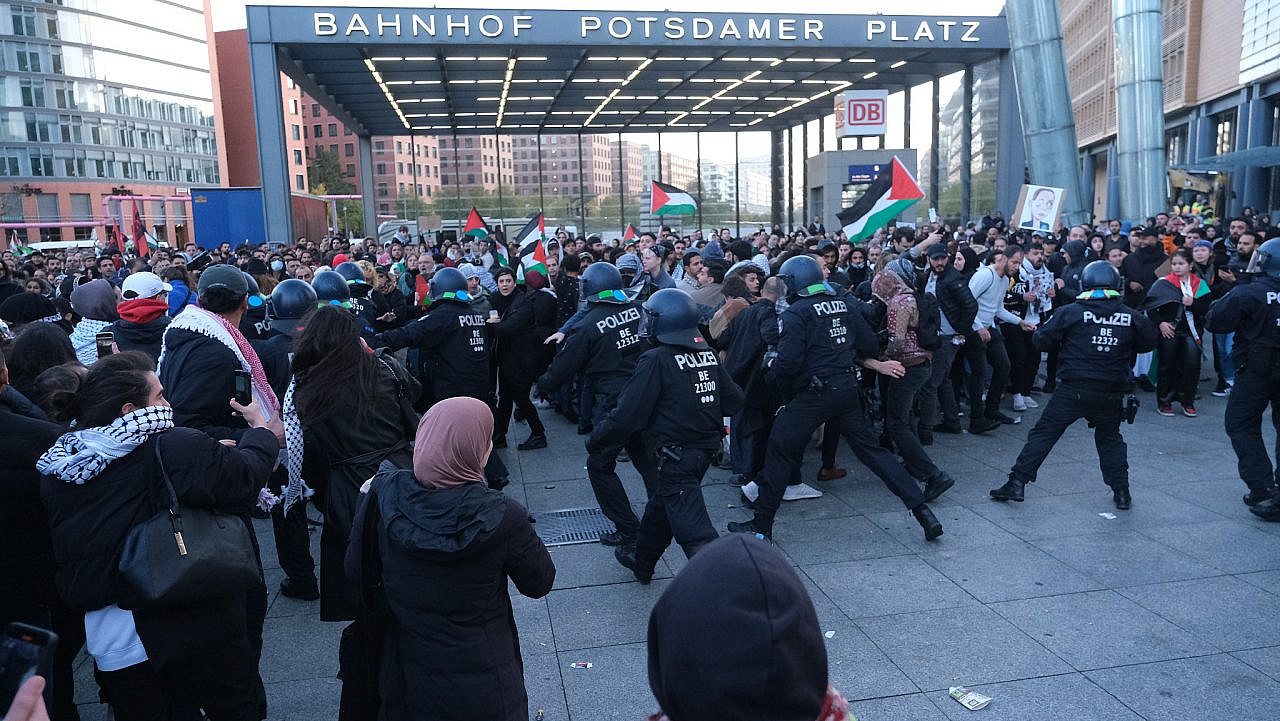
A Palestine solidarity demonstration in the Potsdamer Platz area, Berlin, October 15, 2023. The police suppressed the demonstration shortly after authorizing it.
One of the first cases marking the escalation in silencing occurred on Oct. 8. Malcolm Ohanwe, a Black German-Palestinian journalist, had penned a Twitter thread placing the October 7 attack in the context of the decades-long Israeli occupation, the siege of Gaza, and the suppression of Palestinian protests. Although the thread did nothing to glorify the violence, providing such context was deemed sufficient grounds for punishment, leading public service broadcaster Arte to immediately and publicly cut all ties with Ohanwe.
Later that same month, the Axel Springer publishing house fired an apprentice journalist for raising questions internally about the publisher’s pro-Israel policies. The Bundesliga soccer team Mainz 05 immediately suspended (and later terminated the contract of) one of its players for posting “From the river to the sea, Palestine will be free” on Instagram, which he has since deleted — a matter first publicized by the Bild tabloid, published by the aforementioned Axel Springer house.
Also in October, the northern state of Schleswig-Holstein saw its state secretary for social affairs forced to suspend her duties because she had shared a post condemning both Hamas and the Israeli occupation.
Tread carefully — or else
The scale of denunciation and paranoia has affected nearly every sector of life in Germany. This includes academia, the supposed bastion of free expression, such as when the Max Planck Institute fired the renowned anthropologist Ghassan Hage in February. But the illiberal turn has especially shaken Germany’s cultural scene, endangering not only individual careers but entire institutions.
Throughout October, singers, artists, publishers, activists, academics, and DJs saw their performances, museum talks, exhibitions, poetry book launches, and conferences canceled, or had interviews retracted. Some of them faced no particular accusation at all, as when a prize ceremony for Palestinian author Adania Shibli, scheduled for the Frankfurt Book Fair, was indefinitely postponed.
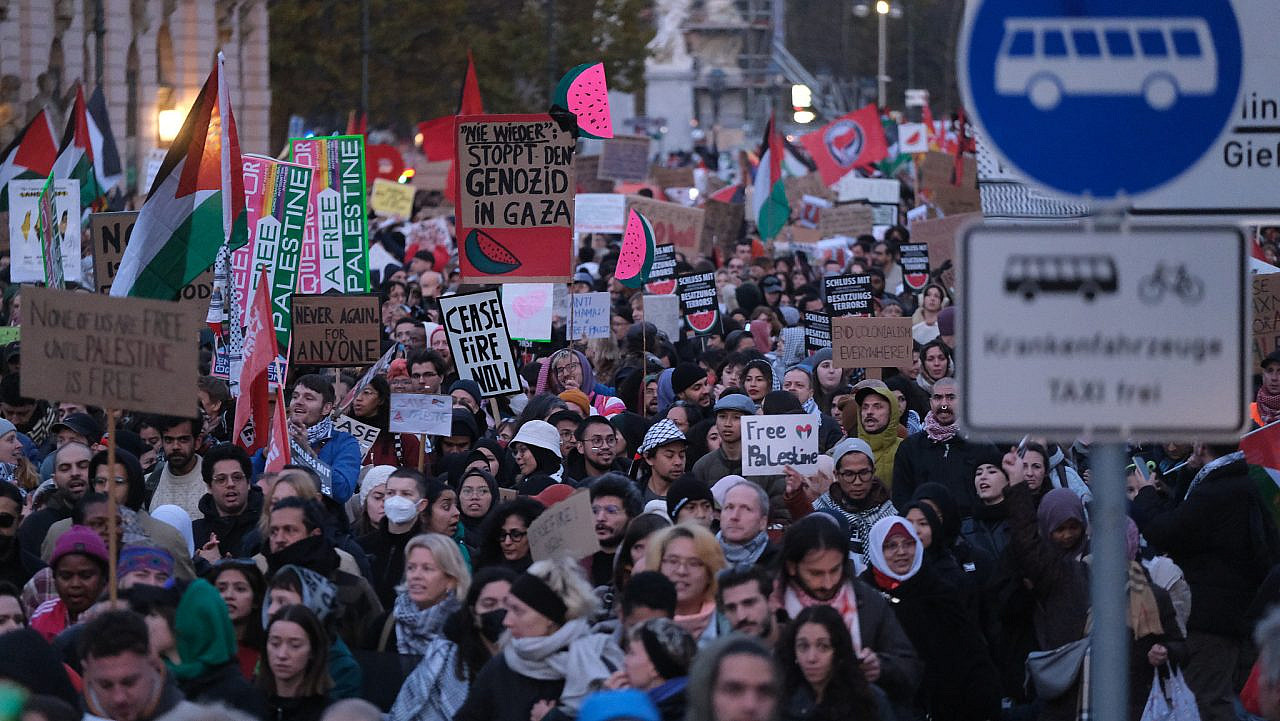
A Palestine solidarity demonstration in Berlin’s municipal square in the museum district, November 4, 2023.
The rapid pace of cancellations, disinvitations, and occasional firings continued through November, with a new case surfacing almost every day. And while the intensity has slackened since then, not a week goes by without some new story of intrusiveness and harassment emerging.
For instance, at the same time as the Berlinale scandal, Egyptian filmmaker Mohammad Shawky Hassan revealed that a Berlin gallery had demanded that before he could put Arabic writing on a wall as part of a group exhibition, he had to provide a translation for prior approval by the gallery and its “cooperation partners.” The gallery director justified the vetting by citing a requirement of translation attached to funding from the city government.
In November, meanwhile, all the members of the Finding Committee for the next edition of Documenta, a major contemporary art exhibition held in the central city of Kassel every five years, resigned in protest: one of their colleagues had been forced to resign after the Süddeutsche Zeitung broadsheet accused him of antisemitism over his signing of a 2019 petition. Already mired in chaos after last year’s Documenta became the center of a landmark antisemitism scandal, a new Finding Committee has yet to be announced ahead of the next edition, slated for the summer of 2027.
Meanwhile, the 2024 Biennale for Contemporary Photography in the Rhine-Neckar Triangle region was canceled in its entirety after the board took issue with one of the curators’ social media activity. In the press release announcing the cancellation, the board notes its consequences “jeopardise the future of the entire event” as it enters its third decade.
In an alarming twist, giving a platform to Jewish critics of Israel has itself become an excuse for German politicians to threaten cultural institutions. Such was the case for Oyoun, a migrant-led cultural center, which refused to give in to political pressure and cancel the 20-year anniversary event of the Jewish anti-Zionist group Jüdische Stimme in November. Berlin’s Culture Minister Joe Chialo ended the center’s contract with the city government, effectively shuttering Oyoun, citing “hidden antisemitism.”
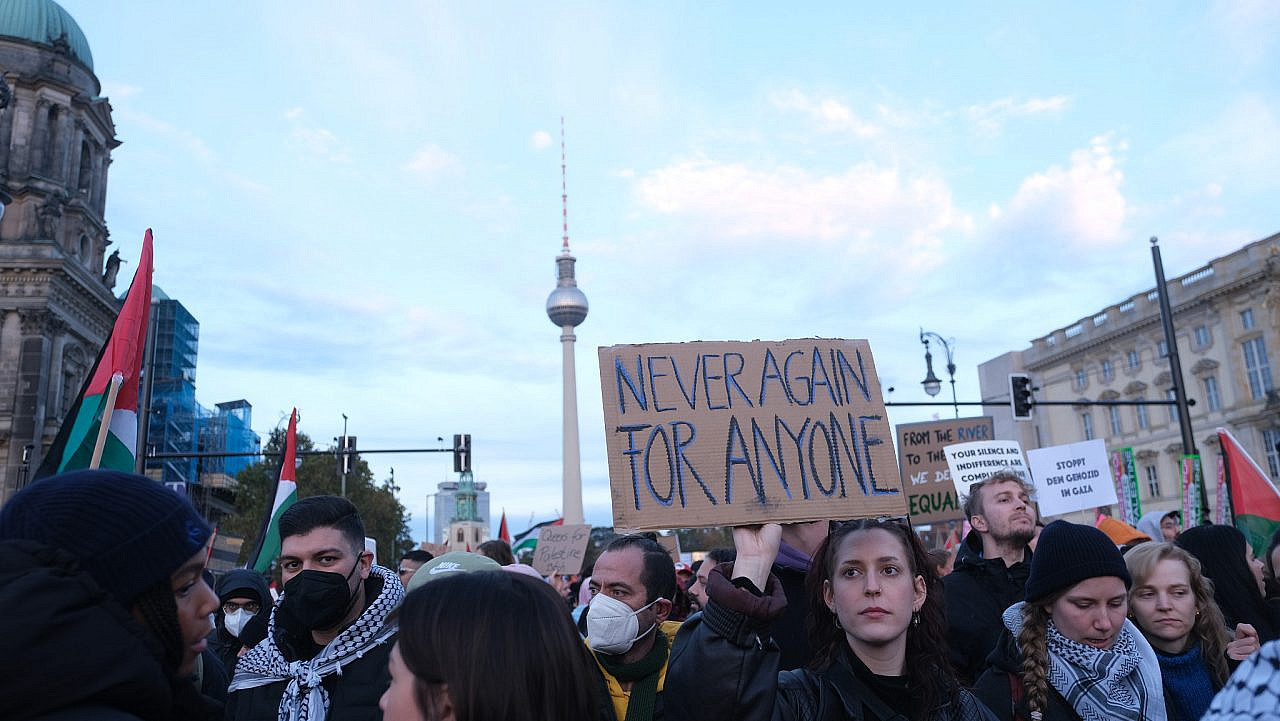
A Palestine solidarity demonstration in Berlin’s municipal square in the museum district, November 4, 2023.
Echoing this dangerous precedent, some German politicians — especially those from the center-right Free Democratic Party (FDP) — have been questioning future public funding for the Berlinale film festival due to the scandal around Abraham and Adra, as well as some other artists who took to the festival’s stages to express solidarity with Palestinians.
Generous state funding for the arts and culture has long been seen as a critical part of maintaining a democratic society in Germany. But while broad freedom of artistic expression is guaranteed by the constitution, cultural institutions are dependent on public funds which politicians can effectively threaten to sever, placing them under acute pressure to conform. Even without formal rules restricting expression, such calls signal to directors and curators that they must tread carefully — or else.
Legitimizing xenophobia
Throughout this cascade of censorship, German authorities and politicians have proclaimed the same fundamental motive: fighting antisemitism as part of Germany’s historical responsibility after the Holocaust.
But while large swathes of the country’s political spectrum are willing to accept and even support such authoritarian interventions in order to uphold Zionism, it is increasingly glaring how these efforts play into a generalized targeting of all those treated as strangers in Germany. Above all, these are people with a family history in Muslim-majority and other Global South countries.
In recent months, Germany’s government has implemented a “deportation offensive,” ostensibly responding to the country’s perennial anti-migrant panic which is fueling an ascendant far right. One of its justifications has been the specter of “imported antisemitism,” referring to anti-Israel sentiment expressed by newcomers to the country, primarily those from the Middle East.
These politics of supporting Israel while demonizing migrants as the source of antisemitism in Germany unites the far right with the right, center, and significant parts of the left, twisting the crucial fight against bigotry into a legitimizing ideology for xenophobia. And when it ends up directly harming Jewish people, the absurdity is impossible to ignore.
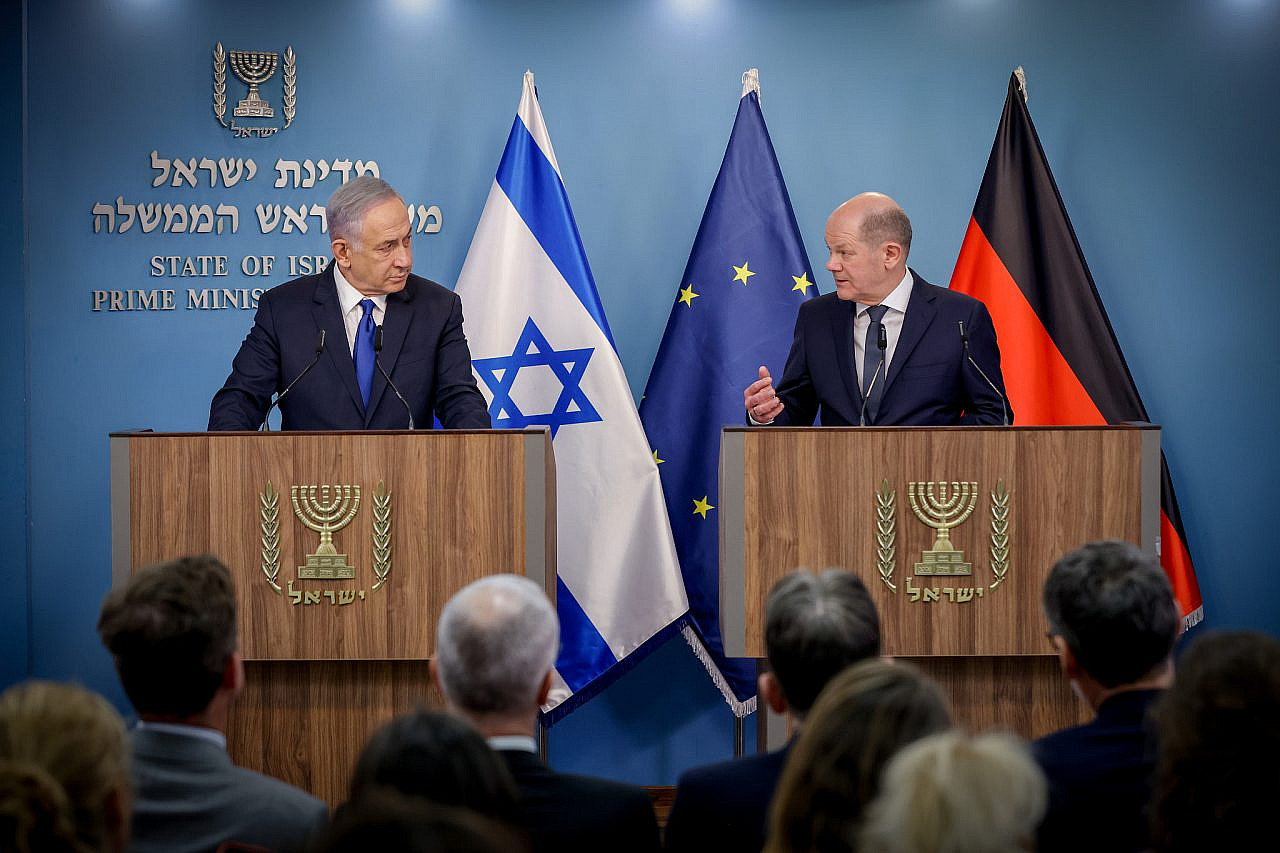
Israeli Prime Minister Benjamin Netanyahu holds a press conference with Chancellor of Germany Olaf Scholz at the Prime Minister’s Office in Jerusalem, February 17, 2024. (Olivier Fitoussi/POOL)
When the post-Berlinale furor led far-right Israelis to accost Yuval Abraham’s family home, he noted, in a tweet that was read by millions, how outrageous it is for German politicians to whip up outrage against Jewish critics of Israel, including descendants of Holocaust survivors like himself. But as Germany has ramped up its “fight against antisemitism” over the past decade, it is startlingly common for guests invited from abroad, even Jewish ones, to be excoriated by Germans in the name of this effort.
German authorities have increasingly institutionalized this agenda, appointing “antisemitism commissioners” at all levels of government. As celebrated Russian-American Jewish writer Masha Gessen noted in a widely-circulated New Yorker essay published early November, most of these commissioners are not Jewish — but many of their targets are. Indeed, according to our documentation at Diaspora Alliance, almost a quarter of all known censorship and cancellation cases in 2023 had Jewish targets.
Just one month after their New Yorker essay, Gessen became part of that statistic. A major pro-Israel group that is partly funded by the German Foreign Ministry took issue with a comparison Gessen’s essay drew between Gaza and Nazi-imposed ghettos, and successfully pushed for the cancellation of a ceremony awarding Gessen the Hannah Arendt Prize for Political Thought.
‘Strike Germany’
While many Germans may prefer to imagine themselves as “less antisemitic than thou,” sometimes the international criticism cuts through. When the person targeted is sufficiently prominent, as with Gessen and Abraham, the harsh reactions from outside the German bubble can become hard to ignore — especially for cultural institutions proud of their international standing and prestige.
In Gessen’s case, the reactions led the Böll Stiftung to host a public conversation with the writer after the canceled ceremony: the de-platforming backfired, only increasing the visibility for Gessen’s criticism.
But this result depended on the platform they already had; in the vast majority of cases, few in Germany ever hear about this kind of censorship, and fewer still get wind of it abroad. Activists have been trying to draw attention to the flood of cases, resulting among other things in an “Archive of Silence” followed by thousands on Instagram.
Meanwhile, since October, cultural workers and academics around the world have started publicly canceling and refusing invitations to Germany in protest of the country’s censorship and anti-Palestinian foreign policy. In January, a collective effort was launched under the title “Strike Germany,” garnering support from such prominent figures as Nobel laureate author Annie Erneaux.
In response, German journalist Sebastian Engelbrecht took to national public radio to suggest that Germany itself is now being subjected to antisemitism by virtue of its support for Israel. Strike Germany, he argued, sought to “erase Germany from consciousness” in a manner akin to the historical effort to physically erase Jewish life.
As the absurdity intensifies, it has also become harder for international observers to ignore how Germany’s obsessive pro-Israelism has been twisted into a tool of authoritarianism and xenophobia. As a result, the country’s self-image — civilized, cosmopolitan, and open — is fast becoming a story Germans can only tell themselves. And with attempts underway in many other countries to clamp down on criticism of Israel in the name of protecting Jews, the German travesty is a warning that must echo far beyond its borders.
____________________________________________
Michael Sappir is a leftist writer and organizer from Israel, based in Germany.
Go to Original – 972mag.com
Join the BDS-BOYCOTT, DIVESTMENT, SANCTIONS campaign to protest the Israeli barbaric siege of Gaza, illegal occupation of the Palestine nation’s territory, the apartheid wall, its inhuman and degrading treatment of the Palestinian people, and the more than 7,000 Palestinian men, women, elderly and children arbitrarily locked up in Israeli prisons.
DON’T BUY PRODUCTS WHOSE BARCODE STARTS WITH 729, which indicates that it is produced in Israel. DO YOUR PART! MAKE A DIFFERENCE!
7 2 9: BOYCOTT FOR JUSTICE!
Tags:
European Union,
Gaza,
Genocide,
Germany,
Israel,
Palestine,
West Bank
Share this article:
email
mastodon
facebook
🔗 copy link
DISCLAIMER: The statements, views and opinions expressed in pieces republished here are solely those of the authors and do not necessarily represent those of TMS. In accordance with title 17 U.S.C. section 107, this material is distributed without profit to those who have expressed a prior interest in receiving the included information for research and educational purposes. TMS has no affiliation whatsoever with the originator of this article nor is TMS endorsed or sponsored by the originator. “GO TO ORIGINAL” links are provided as a convenience to our readers and allow for verification of authenticity. However, as originating pages are often updated by their originating host sites, the versions posted may not match the versions our readers view when clicking the “GO TO ORIGINAL” links. This site contains copyrighted material the use of which has not always been specifically authorized by the copyright owner. We are making such material available in our efforts to advance understanding of environmental, political, human rights, economic, democracy, scientific, and social justice issues, etc. We believe this constitutes a ‘fair use’ of any such copyrighted material as provided for in section 107 of the US Copyright Law. In accordance with Title 17 U.S.C. Section 107, the material on this site is distributed without profit to those who have expressed a prior interest in receiving the included information for research and educational purposes. For more information go to: http://www.law.cornell.edu/uscode/17/107.shtml. If you wish to use copyrighted material from this site for purposes of your own that go beyond ‘fair use’, you must obtain permission from the copyright owner.







